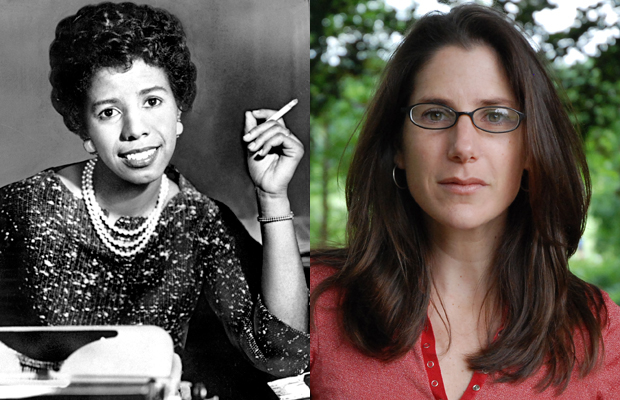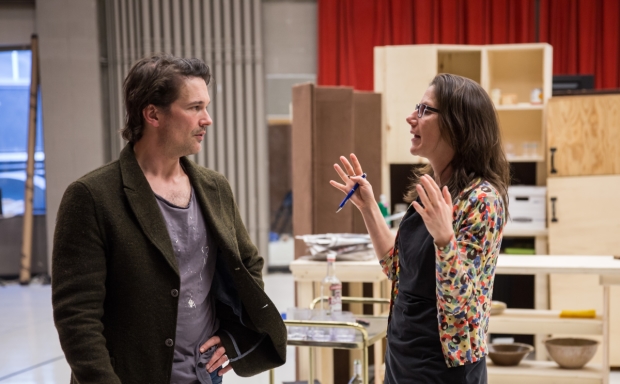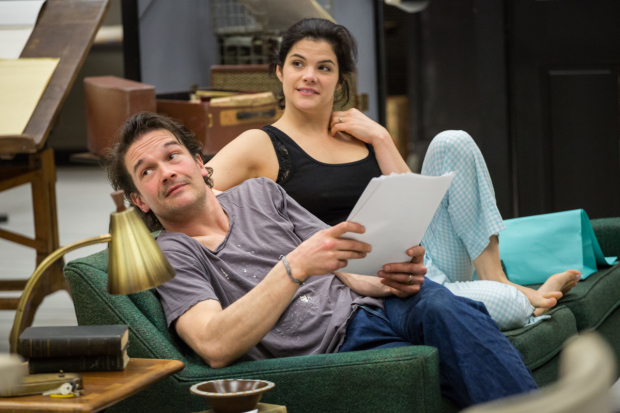Anne Kauffman Reintroduces Lorraine Hansberry's The Sign in Sidney Brustein's Window
The ”A Raisin in the Sun” playwright’s final work is the centerpiece of the Goodman Theatre’s Lorraine Hansberry Celebration.
The Goodman Theatre will honor the life and work of Chicago-born writer Lorraine Hansberry with its upcoming monthlong Lorraine Hansberry Celebration, running April 30-June 5. The centerpiece of the event is a production of her play The Sign in Sidney Brustein's Window, directed by Anne Kauffman. Of course, Hansberry is best (in fact, almost exclusively) known for her seminal first play A Raisin in the Sun, but Kauffman believes it's about time we brushed up on her other works.
"It's very important to me that this play be reintroduced to our American culture," Kauffman told TheaterMania. With the added perspective of more than 50 years, she said, we're now better prepared to understand what Hansberry was doing with Sidney Brustein's Window, which Kauffman calls "ahead of its time."
Hansberry's second and final staged play, The Sign in Sidney Brustein's Window ran on Broadway in late 1964, closing only days before Hansberry died at the age of thirty-four from pancreatic cancer. "Her ambitions are bigger in this play," explains Kauffman, contrasting Hansberry's final work against A Raisin in the Sun. "She's taking on a larger swath of society and she's concerned with more than one issue. Now she's addressing a cross section of our world…She's an American writer. And that's what this play proves."

(photos provided by Goodman Theatre)
How were you introduced to this play?
I came across this play when I was an undergrad. In it the wife of Sidney Brustein has a monologue about how horrible auditioning is, and I actually used that monologue when I was auditioning, which was maybe not such a good idea. It sort of attacked directors and producers, so it was a little ill-conceived. I'm no longer acting, so you can understand where I'm coming from.
Several years later I was teaching at NYU and one of my directing students wanted to do it as a thesis project and I thought, "Oh my god, why do you want to do this totally old-school play?" But we let her do it and I was her mentor so I sat in on rehearsals, and I was blown away. I was completely taken by this play.
What were you taken with?
First and foremost, I was taken with the marriage at the center of the play. I think a lot of people think of it as a very political play. It is that, but really at its heart, it's about a marriage between Sidney Brustein and his young wife, Iris Parodus, and how they're growing apart and how she's sort of growing up without him noticing.
And then how immediate and urgent its social and political debates were. I think that the majority perspective on it is that it's dated, and it's sort of shocking to me people think that. The thing that's so incredible about Lorraine Hansberry and this play is that she and this play recognize the social and political ills of our time, and also the personal ills of our time, but have such a strong belief in humanity and our ability to triumph over these ills. The play is about commitment and reengagement on a very personal level. Sidney and Iris need to find a way of recommitting, reengaging, and looking at each other for who they are in this moment. Just like we as a country need to look at who we are in this moment and not ignore who we are in order to take the right steps.

(© Liz Lauren)
Tell me about the history of this play.
It wasn't very well-received and I have my theories as to why it wasn't well received, one of which happens to be the fact that she was lauded as the voice of the African-American people in plays and she wrote this play about a bunch of white people. And today, we still have a problem allowing people of different cultures and races to write about anything other than their own culture and race — and as white people we get to write about everyone else's culture. I also think that her ambitions with this play were larger and they were wilder and woolier. It's a bit of a mix of style and I think that's actually way ahead of her time. Now we're all po-mo, we're, like, even post-post -modern. So we're used to that sort of collage of style, but in 1964, not really.
One of my favorite stories about this play is that , there were several groups of artists and politicians and religious leaders who got together and wrote their own separate open letters to The New York Times, saying how important the play was and how it needed to keep going. Anne Bancroft and Mel Brooks and Shelley Winters were writing these letters saying that the critics didn't understand what she was doing. And as the play was threatening to close, at the end of every performance they'd say to the audience, "You know we're not sure we can continue running this play. Would you please tell your friends to come?" And audiences were beside themselves and they would pass around a hat.
What do you wish people knew about Lorraine Hansberry?
We always say, "Oh it's so sad that she died so early, there's so many more plays in her." And that's definitely true, but the woman was prolific in her writings. She was not just a playwright. She was an activist. She was a journalist. She was a speech giver. James Baldwin was a great friend of hers and he was intimidated by her. Because she was this epic force. So I feel like what people need to understand about her is that she was a playwright, but her playwriting was only one facet of her activism. She was an extraordinary person.










